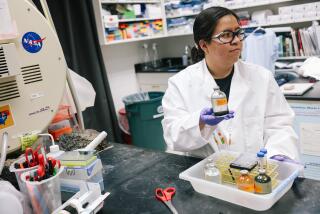Apollo rocks analysis: solar wind made moon water
Analyzing grains of soil collected from three Apollo lunar missions, geochemists have figured out that the hydrogen in trace amounts of water on the moon’s surface probably came from solar wind, the outflow of positively-charged hydrogen from the sun.
For decades, scientists didn’t find much hydrogen in the lunar samples that had been returned to Earth, said Yan Liu, a research professor at the University of Tennessee and lead author of the lunar water study, which was published Sunday in Nature Geoscience.
But in 2008, scientists discovered trace amounts of hydrogen in lunar soil, and in 2010 and 2011 more discoveries followed, she said. Excited by those discoveries, scientists took the next step: to try to figure out if that hydrogen was contained in water and where it might have come from.
That’s where Liu’s experiment fit in. Her team analyzed the chemical form of the hydrogen, as well as what hydrogen isotopes -- different versions of the element -- were present in the samples. They found that the hydrogen in the rocks was indeed water. They also found that only a relatively small amount of the hydrogen in the water was of the heavier type known as deuterium.
Water from comets and the water on Earth have relatively higher amounts of deuterium. Solar wind, which is made of positively-charged hydrogen ions, lacks deuterium because the heavier isotope is consumed by fusion in the sun’s interior.
Constant bombardment by solar wind, over more than 4 billion years, could have deposited enough hydrogen on the moon’s surface to seed the water the researchers detected.
“Our results show that most of the hydrogen [in these lunar soils] comes from the solar wind hydrogen,” Liu said.
There may also be solar wind hydrogen on the surface of asteroids, the planet Mercury, and other bodies in the solar system, she added. It would not collect as easily on Earth because the planet’s atmosphere and magnetic field protect it.







